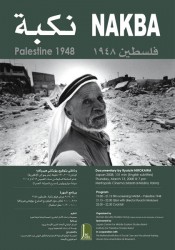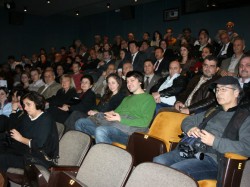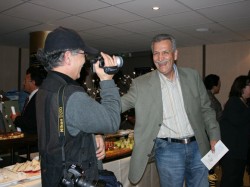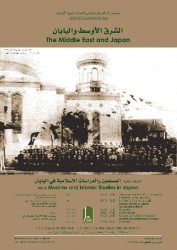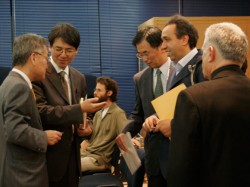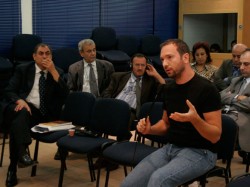| Date / Time | Thursday, March 13, 2008 19:00-22:30 |
|---|---|
| Venue | Al-Madina Theater (Hamra Street, Beirut, Lebanon) |
| Organized by | Human Security Studies Group (Japan Society for the Promotion of Science) |
| Sponsores by | *Japan Center for Middle Eastern Studies(JaCMES) *Institue for Palestine Studies, Beirut |
| *The National Institution of Social Care and Vocational Center *Umam Documentation & Research |
Film screening “NAKBA – Palestine 1948″
JaCMES Lecture Series The Middle East and Japan No.2
“Muslims and Islamic Studies in Japan ”
| Date / Time | Friday, February 22, 2008 18:00-20:15 |
|---|---|
| Venue | Room “Ile de France”, 1st Floor, Crowne Plaza, Hamra Street |
| Language | Arabic and English (simultaneous interpretation available) |
| For further Information | 01-975851 |
| 18:00-18:10 | Welcome Address: Prof. Hidemitsu Kuroki (Director, JaCMES) |
|---|---|
| 18:10-18:50 | Lecture 1: Prof. Akira Usuki “Islamic Studies in Japan during World War II” |
| 18:50-19:05 | Discussion |
| 19:05-19:20 | Coffee Break |
| 19:20-20:00 | Lecture 2: Prof. Keiko Sakurai “Muslims in Contemporary Japan” |
| 20:00-20:15 | Discussion |
- Lecture 1
- Islamic studies in wartime Japan began to flourish in 1938 (one year after the outbreak of the Japan-China War) with the establishment of several research institutes. The purpose of their activities was, above all, to mobilize the Muslims in China to counter both the Chinese nationalists and communists. Prof. Akira Usuki will explain the characteristics distinguishing Islamic studies during the war years from the postwar period in Japan. He will then critically discuss how the wartime ideology of the “Greater East Asia Co- Prosperity Sphere” situated the roles of Muslims in Asia, introducing the political thought of Shumei Okawa, a representative ideologue of that period, who published a Japanese translation of the Quran in 1950.
- Lecture 2
- Muslims living in contemporary Japan number approximately seventy thousand. The majority of this population is comprised of immigrants from various Asian and Middle Eastern countries, such as Indonesia, Bangladesh, Pakistan and Iran, who came to Japan in search of employment during the mid-1980s and early 1990s. Many married Japanese women and raised their family in Japan. Muslims have managed to influence their communities (by importing halal foods and building mosques, for example) while conforming to local societies there. Prof. Keiko Sakurai will explain their socio-economic backgrounds, share insights into the daily lives of Muslims in Japan, and examine their social interaction with Japanese society.
Prof. Akira Usuki specializes in Palestine/Israel studies and teaches modern Middle Eastern history at Japan Women’s University, Tokyo. His publications include The Invisible Jews: The Orient of Israel (1998), Fundamentalism (1999), and Palestine-Israeli Conflict in Global Dimension (2004). (All in Japanese)
2007 Middle Eastern and Islamic Studies in Japan: The State of the Art
| Date | Monday and Tuesday, November 26 and 27, 2007 |
|---|---|
| Venue | Crowne Plaza Beirut, Hamra Street, Beirut (Ile de France Room, 1st Floor) |
| Monday, November 26 | |
|---|---|
| 16:00-16:05 | Welcome address by Hidemitsu Kuroki (JaCMES) |
| 16:05-16:50 | Aiko Nishikida (Research Fellow, ILCAA, Tokyo University of Foreign Studies) “Palestinians in Diaspora: Their Identity and Nationalism in Jordan” |
| 17:50-17:35 | Akiko Sugase (Research Fellow, The Graduate University for Advanced Studies) “The Third Face of Janus: Narratives and Images on the Rev. George Hakim among the Arabs in Galilee” |
| 17:35-17:50 | Coffee Break |
| 17:50-18:35 | Satoshi Udo (Ph.D. Candidate, The University of Tokyo) “Translating Theatre: Rabih Mroué in Tokyo” |
| 18:35-19:20 | Kenichiro Takao (Ph.D. Candidate, Doshisha University) “Ahmad Kuftaru, A Great ‘Ulama’ in Modern Syria: About Its Construction of Intellectual Authority” |
| Tuesday, November 27 | |
|---|---|
| 10:30-11:15 | Akiko Yoshioka (Researcher, The Institute of Energy Economics, Japan) “Iraq and the Neighboring Arab Countries after the War” |
| 11:15-12:00 | Yoko Uno (Research Associate, Tsudajuku University) “Parliamentary Opposition and Diplomacy on the Eve of Republic of Turkey: The Second Group’s Attitude to the Lausanne Treaty (1923)” |
| 12:00-12:15 | Coffee Break |
| 12:15-13:00 | Yoko Sekiguchi (Ph.D. Candidate, The University of Tokyo) “A Case Study on the Introduction and Attempt of ‘Sosyal Demokrasi’ in Turkey: Republican People’s Party (RPP), 1965-1972″ |
| 13:00-13:05 | Closing Remarks by Hidemitsu Kuroki |
- Commentators :
- Pierre Abi-Saab (al-Akhbar)
- Massoud Daher (Lebanese University)
- Timur Göksel (American University of Beirut)
- Sari Hanafi (American University of Beirut)
- Toufic Houri (Imam Ouzai College of Islamic Studies)
- Hilal Khashan (American University of Beirut)
- Observers :
- Akimitsu Ikeda (Lebanese University)
- Sylvain Perdigon (Institut Français du Proch-Orient)
- Mitsuko Sano (University of Saint Joseph)
- Mahmoud Soueid (Institute for Palestine Studies)
- Seiko Sugita (American University of Beirut)
JaCMES Lecture Series The Middle East and Japan No.1
“A Tatar Islamic Thinker Abdürreshit Ibrahim’s Travelogue to Japan, 1909″
| Date / Time | Tuesday, November 6, 2007 18:00- 20:00 |
|---|---|
| Venue | Press Club, 2nd Floor, A2-1, Azariyeh Bldg.,Beirut Central District |
| 18:00-18:10 | Welcome Address: Prof. Hidemitsu Kuroki (Director, JaCMES) |
|---|---|
| 18:10-18:50 | Lecture: Prof. Hisao Komatsu (University of Tokyo) “A Pan-Islamist’s Journey: Russia, the Ottoman Empire and Japan” |
| 18:50-19:30 | Lecture: Prof. Abderrahim Benhadda (University of Muhammad V-Rabat) “Self and Other: A Muslim in Japan at the Beginning of 20th Century” (in Arabic) |
| 19:30-20:00 | Discussion |
Japan Center for Middle Eastern Studies (JaCMES) is now launching a series of lectures “The Middle East and Japan”, in which various subjects of the relations between the two areas will be discussed. The first lecture meeting deals with a travelogue written by a Tatar Muslim Abdürreshit Ibrahim (1857-1944), who traveled from Kazan, the capital of the Republic of Tatarstan today, to Japan through Siberia and stayed in the country for five months in 1909. This Islamic thinker in exile contributed his vivid descriptions of the Far East country to a local journal published in Kazan. He compiled the articles and other lectures on Japan as well as other parts of Asia into a book titled “The World of Islam” (‘Alam-i Islam) in Ottoman Turkish and published it in Istanbul in 1910. During his stay in Japan, Ibrahim met and talked with a number of people of varieties, from a rikisha (a coach pulled by a man) driver to Hirobumi Ito, the first, fifth, seventh and tenth Prime Minister. Ibrahim was the first Muslim intellectual to introduce the modern Japanese society and culture to the Middle East, basing on his own experiences of life in the country.
Professor Hisao Komatsu teaches the modern history of Central Asian countries and Ottoman history at the University of Tokyo. Prof. Komatsu translated Ibrahims travelogue from Ottoman Turkish into Japanese and published it with his wife Prof. Kaori Komatsu of the University of Tsukuba.
Professor Abderrahim Benhadda of University of Muhammad V, Rabat, is specializing in Ottoman history, from the view point of international exchange between the Empire and Morocco. Prof. Benhadda is planning to translate the travelogue from Ottoman Turkish into Arabic.
